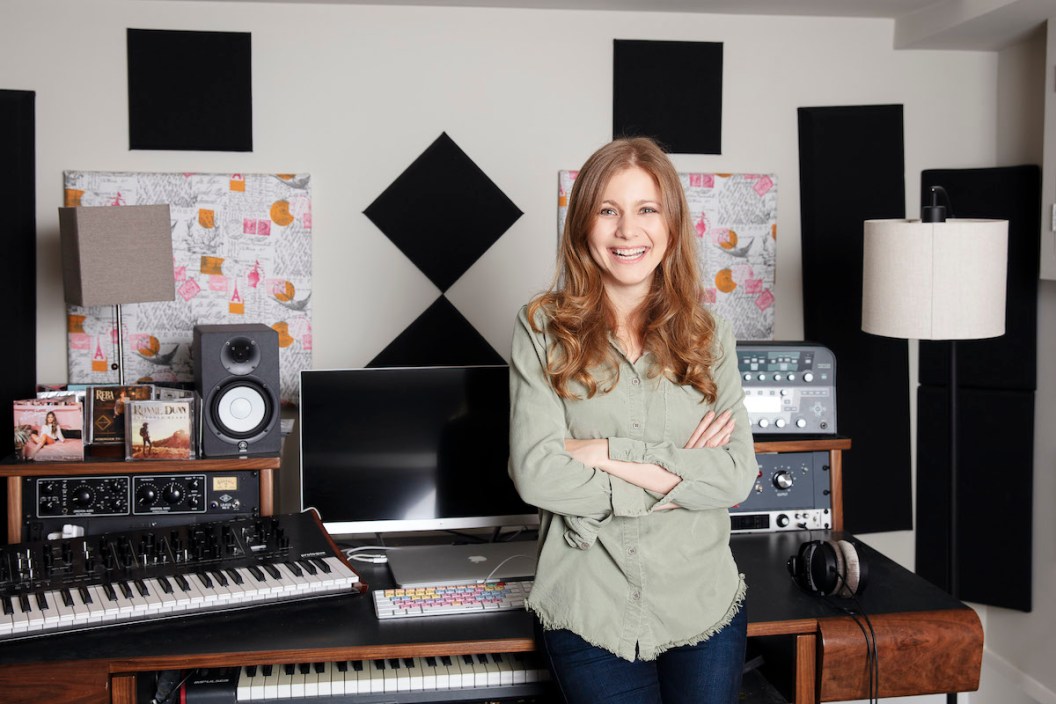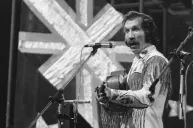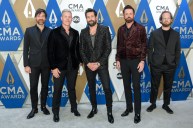Nashville-based songwriter, multi-instrumentalist and producer Alex Kline became both a trailblazer and a trivia answer in 2021 when Canadian country artist Tenille Arts' uptempo look at love "Somebody Like That" reached No. 1 on the Mediabase Country Aircheck chart.
Kline produced the song and co-wrote it with Arts and Allison Veltz, making it the highest-charting country hit produced, written and sung by an all-women team. It's also the first No. 1 country song solely produced by a woman.
In a genre historically guilty of gender disparities, few roles remained as much a boys' club over time as record producer. Gail Davies gets credited as the first woman producer in mainstream country music (she produced her own solo album The Game in 1979), with "Tennessee Whiskey" co-writer Linda Hargrove learning similar skills under the tutelage of recent Country Music Hall of Fame inductee Pete Drake (proving what can happen when gatekeepers swing open the gates). The list of women producers in the genre has grown at a snail's pace since to include the late Lari White, co-producer of Toby Keith's 2006 album White Trash With Money. Even counting the crucial production work of Alison Krauss and other more roots-grounded artists makes for a very short (albeit very stacked) list.
While Kline wasn't the first woman to fearlessly kick down that door and proceed to outshine those allowed the benefit of a doorstop, she's the first to help infiltrate something even less inclusive in the 21st century than country music studios: the top of a country music radio chart.
To secure her place in history, Kline focused less on the glass ceiling above and more on finding creative fulfillment with her full skillset.
"It's always just been I wanted to produce and write, and I just kind of more saw it to myself as maybe an advantage to a degree because I looked a little bit... I don't want to say special, but just like different than another guy producing," she told Wide Open Country. "It maybe made me stand out a little bit more by being a woman. I tried to see it as an advantage as opposed to a disadvantage, which of course I'm sure there are many as women being in the producer chair. It didn't help me too much to just sit and complain about it."
Kline developed this frustratingly necessary outlook someplace way more highfalutin than Music Row.
"Going to [Berklee College of Music in Boston], I was guitar principal there, and I was one of maybe eight women in a department of about 1,000," she explained. "I was kind of always used to being the only woman in the room for while and just tried to see it as something that separated me from the pack."
Since arriving in Nashville, Kline's curiosity and do-it-yourself approach have expanded her talents beyond guitar picking and songwriting.
"When I moved down to Nashville in my early 20s, I started going to different shows at the Station Inn and places like that and kind of was more into Americana and bluegrass music when I first moved down here and saw these great players playing the dobro, the mandolin, banjo and all that stuff," she said. "I just got inspired by their playing and those instruments and I just thought, 'Well, I'm just going to go get a cheap banjo or a get cheap mandolin or something and see if I can figure it out.' If you know enough about guitar, you can kind of figure out the patterns of those instruments pretty easily. Or at least I could and fake it at least enough to fool people."
After mastering multiple stringed instruments and sharpening a way with words that's made her a co-writer of songs cut in recent years by the likes of Ronnie Dunn ("Damn Drunk"), Reba McEntire ("The Bar's Getting Lower") and Mitchell Tenpenny ("I Get the Picture"), Kline accidentally positioned herself to fill what she previously considered one of the least desirable roles in the music industry.
"I actually moved to town not wanting to be a producer," she said. "When I went to Berklee, all the kids that were in the engineering and production major were always exhausted and working their butts off and in the studio between 11 and 3 a.m. I was like, 'This seems like a terrible job choice. Just sitting in a windowless room, listening to the same song over and over again.' So I really just wanted to be a songwriter when I moved down here.
"And then the artistry stuff took off for a little bit in a couple of different bands, and then I came back to songwriting," she said. "I really just started becoming a producer out of necessity because I wanted to get some of my demos done without having to go in the studio and pay a bunch of money to go to a demo session. So I had just learned Logic and starting putting just enough down on acoustic guitar and learning how to do a drum loop just so someone could sing to that, and it slowly snowballed into actually producing."
Read More: Keith Urban Surprises Band Members at Nashville High School
In 2013, friend and frequent songwriting collaborator Erin Enderlin encouraged Kline to try her hand at producing.
"Erin Enderlin was the first person who kind of saw that I was producing even before I was producing, or before I thought I was producing, that is," Kline added. "When she had me do her project as well, the I Let Her Talk EP, that was really my first time kind of doing it on purpose. And also we were on such a budget doing that EP that I ended up playing all of the acoustic instruments: dobro, banjo, mandolin, acoustic guitar. I was just able to kind of supplement the rest of it. So that was nice having those skills, and definitely if I go into a studio and feel like I didn't get something out of a player or I just come up with a different part, it is nice to be able to go back and supplement the rest myself."
Producing wasn't so boring after all for Kline, who's gone on to fill that role for Adam Brand, Terri Clark, John King, Maggie Rose, Tara Thompson, Stephanie Quayle and others.
"I've kind of fallen in love with the development process of getting in there with an artist and kind of figuring out what their sound is," Kline said. "It's a fun thing to use a different part of your brain with the production. I would probably go a little bit crazy if I was all day, every day only writing songs and just hoping people would cut songs. It's nice to switch it up and go in the studio and be apart of that creative process and feel like you have a little bit more say in what happens with the songs that you're writing with the artists that you're working with."
The voice Kline brings as a co-writer and producer helped craft a groundbreaking hit relatable to Arts, her collaborators and her fans.
"I think there's definitely an advantage to women working with women," she said. "I think we have shared experiences and listened to a lot of the same stuff growing up and know what really tugs at our heartstrings or what we are drawn to or what [Arts'] fanbase might be drawn to. I think there's definitely an advantage to that, just like there's probably an advantage sometimes to dudes that are working together in their shared experience, as well."
"Somebody Like That's" meteoric rise earned headlines for Kline from the likes of Forbes and People. Each article pointed more eyes and ears to much-needed representation for women interested in becoming producers or engineers.
"I do think even just from when I started producing and became aware of the handful of female producers and engineers in town, I think that has started to grow pretty rapidly," Kline added. "I mean, we're still obviously the minority in town, but just in the last two years, I have met a couple of really great, up-and-coming female producers. One who's really awesome, Karen Kosowski, produces Mickey Guyton and she's done some really awesome stuff for her. There's some other really great female producers and engineers. The more that women see other women producing and engineering, the more that they just don't even think that they shouldn't be doing that."
The curiosity that's moved music business mountains already for Kline remains unquenched as she enters the next phase of her career and learns from a fellow guitarist turned producer.
"I just signed a publishing deal that's a venture with Dann Huff. I'm looking forward to learning from the master," she said. "I've been able to crash some of the sessions that he's had before and learn from him and hang out and he'll show me what he's working on or how he recorded something. Just trying to get better as a producer, always."




